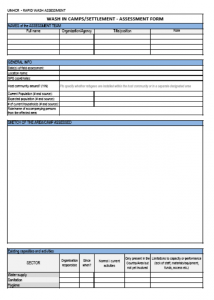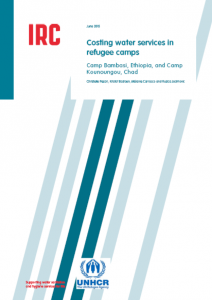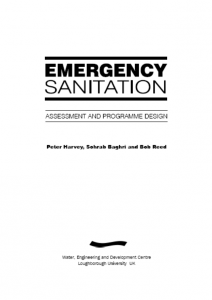
This technical brief is intended to provide guidance for UNHCR staff and Partners involved in winterization of WASH facilities in the current European refugee and migrant situation.
Tags: Approvisionnement en Eau, Climats Froids, Douches, Gestion des Excréta, Réseaux d'Adduction d'Eau, Sensibilisation à l'Hygiène, and Thèmes Transversaux. Locations: Europe, Europe Centrale et États Baltes, and Europe de l'Est. Languages: Anglais. Organisations: UNHCR. Categories: Directives d'Urgence EHA, Directives EHA, Directives Opérationnelles EHA, Documents de Référence EHA, and Principes directeurs EHA.

These rapid (emergency) assessment tools can be used to help assess water supply, excreta management, solid waste management, hygiene and disease vector control conditions in the following refugee settings: These rapid (emergency) assessment tools can be used to help assess water supply, excreta management, solid waste management, hygiene and disease vector control conditions in the following refugee settings: Camps; Settlements; Transit Centres; Schools; Health Centres and Urban Settlements. It also contains references to UNHCR’s WASH indicators and recommendations for data collection.

This report applies the life-cycle costs approach (LCCA) to the provision of water services in two UN refugee camps, Bambasi in Ethiopia and Kounoungou in Chad. It is based on cost data from financial reports in Geneva and both camps and on service-level data collected through the UNHCR monitoring system and on site through water point surveys.
The purpose of the study was (1) to better understand the structure, magnitude and drivers of the cost of providing a targeted level of water service to refugees, and (2) to reflect on the applicability of LCCA in the UNHCR monitoring framework and the potential for implementing it in systematically.

A summary of UNHCR water, excreta management, solid waste management, disease vector control and hygiene promotion standards and indicators for emergency and post emergency refugee settings including means of verification.
Tags: Approvisionnement en Eau, Contrôle et Suivi de la Qualité de l'Eau, Développement des Stratégies EHA, Douches, Écoulement des Eaux, Évaluations EHA, Gestion des Déchets Solides, Gestion des Excréta, Lavage des Mains au Savon, Lutte Antivectorielle, Sensibilisation à l'Hygiène, and Suivi et Evaluation EHA. Languages: Anglais. Organisations: UNHCR. Categories: Normes et Indicateurs EHA.

This document describes UNHCR’s global strategy for public health through a set of guiding principles and strategic approaches including protection; age, gender and diversity; equity; access; sustainability; community empowerment; appropriateness and reliability; partnerships and coordination; capacity building; communication and advocacy; integrated approaches; measurement and monitoring; and innovation. The document describes strategic objectives and enabling actions per sub-sector (Public Health, HIV and Reproductive Health, Food Security and Nutrition, and WASH).
Tags: Approvisionnement en Eau, Coordination EHA, Développement des Stratégies EHA, Droit à l'eau / assainissement, Genre, Gestion des Excréta, Lutte Antivectorielle, Optimisation des Ressources, Protection, Renforcement des Capacités, Santé Publique, Sensibilisation à l'Hygiène, Suivi et Evaluation EHA, and Violence Basée sur le Genre. Languages: Anglais. Organisations: UNHCR. Categories: Directives EHA, Directives Opérationnelles EHA, Documents de Référence EHA, and Principes directeurs EHA.

The book Emergency Sanitation: Assessment and programme design has been produced to assist those involved in planning and implementing emergency sanitation programmes. The main focus of the book is a systematic and structured approach to assessment and programme design. It provides a balance between the hardware (technical) and software (socio-cultural, institutional) aspects of sanitation programmes, and links short-term emergency response to long-term sustainability. The book is relevant to a wide range of emergency situations, including both natural and conflict-induced disasters, and open and closed settings. It is suitable for field technicians, engineers and hygiene promoters, as well as staff at agency headquarters.
Tags: Compostage des Excréta, Égouts et Acheminement des Excréta, Évaluations EHA, Gestion de Programmes EHA, Gestion des Excréta, Réutilisation des Excréta / Urine, Suivi et Evaluation EHA, Toilettes Communautaires, Toilettes Familiales, Traitement des Excréments, and Vidange et Transport d'Excréta. Languages: Anglais. Organisations: WEDC. Categories: Directives d'Urgence EHA and Documents de Référence EHA.

These guidelines have been designed to help those involved in the assessment of emergency water sources to collect relevant information in a systematic way, to use this information to select a source or sources and to determine the appropriate level of treatment required to make the water suitable for drinking.
Tags: Approvisionnement en Eau, Camions Citerne, Collecte des Eaux de Pluie, Contrôle et Suivi de la Qualité de l'Eau, Eaux Souterraines, Évaluations EHA, Forages, Gestion de Programmes EHA, Plans pour la Sécurité en Eau, Pompage d'Eau, Pompe Manuelle, Prospection d'Eau, Protection des Sources, Puits Creusés à la Main, Puits Forés, Réseaux d'Adduction d'Eau, Stockage de l'Eau, Suivi et Evaluation EHA, Traitement de l'Eau, and Traitement de l'Eau au Ménage. Languages: Anglais. Organisations: WEDC. Categories: Directives d'Urgence EHA and Documents de Référence EHA.

The Sphere Handbook is one of the most widely known and internationally recognized sets of common principles and universal minimum standards for the delivery of quality humanitarian response.
Tags: Accès pour Handicapés, Approvisionnement en Eau, Contrôle et Suivi de la Qualité de l'Eau, Coordination EHA, Douches, Droit à l'eau / assainissement, Écoulement des Eaux, Élimination des Eaux Usées, Environnement, Évaluations EHA, Genre, Gestion de l'Hygiène Menstruelle, Gestion de Programmes EHA, Gestion des Déchets Solides, Gestion des Excréta, Installations pour la Lessive, Lavage des Mains au Savon, Lutte Antivectorielle, Plans pour la Sécurité en Eau, Protection, Renforcement des Capacités, Réseaux d'Adduction d'Eau, Santé Publique, Sensibilisation à l'Hygiène, Suivi et Evaluation EHA, Thèmes Transversaux, Toilettes Communautaires, Traitement de l'Eau au Ménage, and Violence Basée sur le Genre. Languages: Anglais. Organisations: SPHERE. Categories: Documents de Référence EHA.

The UNHCR WASH Manual is a comprehensive and authoritative reference document for WASH interventions in refugee settings, built upon the experience of UNHCR and WASH organisations.
Tags: Accès pour Handicapés, Approvisionnement en Eau, Assainissement Total Piloté Par La Communauté, Camions Citerne, Changement de Comportement en Matière d'Hygiène, Collecte des Eaux de Pluie, Compostage des Excréta, Contrôle des Maladies Transmissibles, Contrôle et Suivi de la Qualité de l'Eau, Coordination EHA, Diarrhée Aqueuse, Diarrhée Sanglante, Douches, Droit à l'eau / assainissement, Écoulement des Eaux, Égouts et Acheminement des Excréta, Élimination des Eaux Usées, Évaluations EHA, Forages, Genre, Gestion de l'Hygiène Menstruelle, Gestion de Programmes EHA, Gestion des Décharges, Gestion des Déchets Médicaux, Gestion des Déchets Solides, Gestion des Excréta, Installations Adaptées aux Enfants, Installations pour la Lessive, Lavage des Mains au Savon, Lutte Antivectorielle, Malaria, Plans pour la Sécurité en Eau, Pompage d'Eau, Pompe Manuelle, Prospection d'Eau, Protection, Protection des Sources, Puits Creusés à la Main, Puits Forés, Recyclage, Réutilisation et Réduction des Déchets, Réseaux d'Adduction d'Eau, Réutilisation des Excréta / Urine, Santé et Sécurité, Santé Publique, Sensibilisation à l'Hygiène, Stockage de l'Eau, Suivi et Evaluation EHA, Thèmes Transversaux, Toilettes Communautaires, Toilettes Familiales, Traitement de l'Eau, Traitement de l'Eau au Ménage, Traitement des Excréments, and Vidange et Transport d'Excréta. Languages: Anglais. Organisations: UNHCR. Categories: Documents de Référence EHA.
 Français
Français









